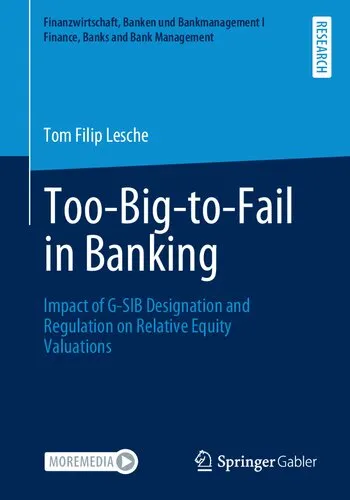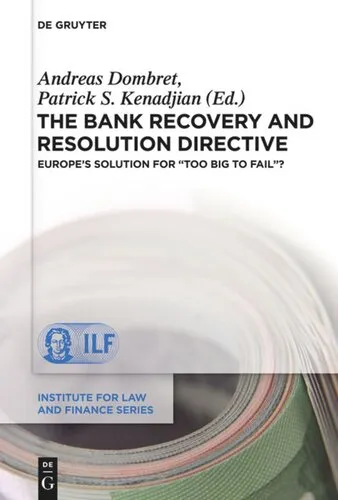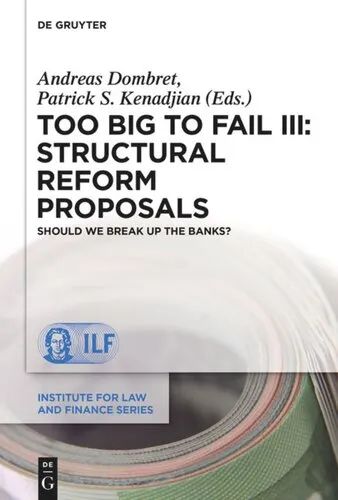Too-Big-to-Fail in Banking: Impact of G-SIB Designation and Regulation on Relative Equity Valuations
4.5
بر اساس نظر کاربران

شما میتونید سوالاتتون در باره کتاب رو از هوش مصنوعیش بعد از ورود بپرسید
هر دانلود یا پرسش از هوش مصنوعی 2 امتیاز لازم دارد، برای بدست آوردن امتیاز رایگان، به صفحه ی راهنمای امتیازات سر بزنید و یک سری کار ارزشمند انجام بدینRelated Refrences:
مقدمه کتاب
کتاب Too-Big-to-Fail in Banking: Impact of G-SIB Designation and Regulation on Relative Equity Valuations به بررسی نقش بانکهای بزرگ سیستمیک جهانی (Global Systemically Important Banks - G-SIBs) در اقتصاد جهانی و تأثیرات تعیین اهمیت این بانکها و مقررات مربوط به آنها بر ارزشهای نسبی حقوق صاحبان سهام میپردازد. این پژوهش بهطور ویژه میکوشد تا ارتباط بین مقررات مالی و پایداری بازارهای سرمایه را بررسی کند.
خلاصهای جامع از کتاب
در این کتاب به دنبال تفسیر چالشهایی هستیم که بانکهای G-SIB با آنها روبرو هستند و عواملی که سبب میشود این بانکها تحت عنوان "بسیار بزرگتر از اینکه شکست بخورند" قرار بگیرند. پژوهش شامل تحلیل مکانیسمهای مقرراتی است که برای حفظ ثبات مالی و جلوگیری از ریسک سیستماتیک طراحی شدهاند. نویسنده به اهمیت سیاستهای نظارتی برای جلوگیری از بحرانهای مالی در سطح جهانی و نیز به تأثیرات اقتصادی و اجتماعی شکست احتمالی این نهادهای بزرگ میپردازد.
نکات کلیدی
یکی از نکات مهم کتاب بررسی تاثیرات تعیین G-SIB بر ارزش نسبی حقوق صاحبان سهام است که نشاندهنده چگونگی تغییر در ارزیابی بازار با توجه به مداخلات نظارتی و اهمیت اقتصادی بانکها است.
- ارتباط میان اندازه بانک و ریسک سیستماتیک
- نقش نظارت مالی در کاهش ریسکهای غیرمنتظره
- پیامدهای اجتماعی و اقتصادی شکست احتمالی بانکهای بسیار بزرگ
- کارایی مقررات اخیر در کاهش احتمال بحرانهای مالی
نقلقولهای معروف
"تعیین بانک به عنوان G-SIB به معنای مسئولیتپذیری بیشتر و نیاز به تحکم قدرت مدیریتی است که بتواند تحمل نوسانات بازار را داشته باشد."
"چالشهای پیشرو برای بانکهای بسیار بزرگ نیازمند سیاستهای نوآورانهی نظارتی است تا از ثبات اقتصادی و اعتماد عمومی به نظام مالی جهانی حفاظت شود."
اهمیت این کتاب
این کتاب برای دانشجویان، پژوهشگران، سیاستگذاران و فعالان حوزه مالی بسیار اهمیت دارد، زیرا به درک عمیقتری از روابط پیچیده میان بانکهای بزرگ، سیاستهای نظارتی و سلامت اقتصادی کمک میکند. در دوران پس از بحران مالی 2008، این گونه پژوهشها به عنوان منابع کلیدی برای توسعه سیاستهای پایدار مالی به شمار میآیند.
Introduction
The global financial system is a complex and interwoven network, and at its heart lies a crucial concept - the "Too-Big-to-Fail" doctrine. This principle gained significant prominence during the financial crisis of 2008, highlighting the associated risks and regulatory challenges of large multinational banks. In "Too-Big-to-Fail in Banking: Impact of G-SIB Designation and Regulation on Relative Equity Valuations," we delve into the intricate world of global systemically important banks (G-SIBs), unraveling the impact of regulatory frameworks on their operations and equity valuations. This book provides an in-depth analysis of how G-SIB designations influence the global banking sector and capital markets.
Detailed Summary of the Book
The book meticulously examines the ramifications of the "Too-Big-to-Fail" policy, particularly focusing on the G-SIB designation. G-SIBs are institutions whose failure could trigger a global economic meltdown. The narrative begins with a historical perspective, charting the evolution of banking regulations and their critical role in maintaining financial stability. Through a combination of empirical research, case studies, and theoretical frameworks, this book illustrates the effects of stringent post-crisis regulations on G-SIBs, especially in terms of their market valuation and competitive positioning.
The book also critiques the underlying assumptions of the existing regulatory measures and explores how these interventions shape market perceptions and investor behavior. By analyzing data-driven insights, it provides valuable perspectives on how regulations can be balanced to ensure both economic growth and systemic stability.
Key Takeaways
- Understanding of the historical and contemporary role of "Too-Big-to-Fail" in banking.
- Insights into the regulatory landscape post-2008 financial crisis, including Basel III and Dodd-Frank Act.
- Analysis of the impact of G-SIB designations on market valuations of banking institutions.
- Critical evaluation of regulatory challenges and the effectiveness of current measures in preventing future crises.
- Strategic frameworks for balancing regulatory interventions and market efficiency.
Famous Quotes from the Book
"The label of being 'too-big-to-fail' is a double-edged sword, wielding power over markets and yet shackling institutions with the weight of expectations."
"Regulation, in the pursuit of stability, must not stifle the very agents of growth it seeks to protect."
Why This Book Matters
In the wake of globalization and digital transformation, the banking sector encounters new challenges and opportunities. This book is instrumental for policymakers, banking professionals, and academicians seeking to decode the impacts of stringent regulations on G-SIBs. It shines a light on the delicate balance between securing financial stability and fostering an environment of innovation and growth within the banking industry.
Furthermore, by decoding the intricacies of market valuations influenced by the G-SIB status, the book stands as a vital resource for investors and financial analysts making informed decisions in the evolving landscape of global finance.
دانلود رایگان مستقیم
شما میتونید سوالاتتون در باره کتاب رو از هوش مصنوعیش بعد از ورود بپرسید
دسترسی به کتابها از طریق پلتفرمهای قانونی و کتابخانههای عمومی نه تنها از حقوق نویسندگان و ناشران حمایت میکند، بلکه به پایداری فرهنگ کتابخوانی نیز کمک میرساند. پیش از دانلود، لحظهای به بررسی این گزینهها فکر کنید.
این کتاب رو در پلتفرم های دیگه ببینید
WorldCat به شما کمک میکنه تا کتاب ها رو در کتابخانه های سراسر دنیا پیدا کنید
امتیازها، نظرات تخصصی و صحبت ها درباره کتاب را در Goodreads ببینید
کتابهای کمیاب یا دست دوم را در AbeBooks پیدا کنید و بخرید
1626
بازدید4.5
امتیاز0
نظر98%
رضایتنظرات:
4.5
بر اساس 0 نظر کاربران
Questions & Answers
Ask questions about this book or help others by answering
No questions yet. Be the first to ask!














